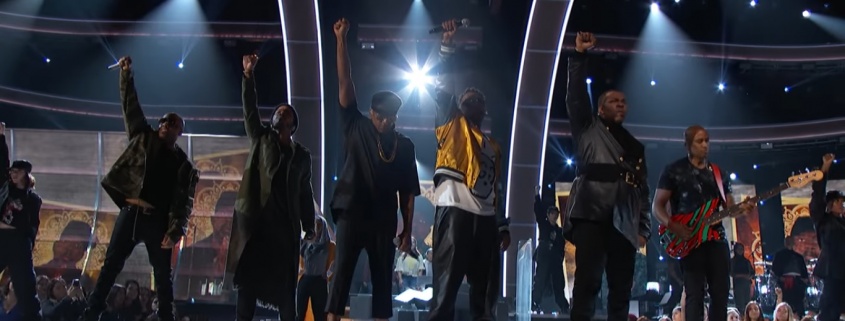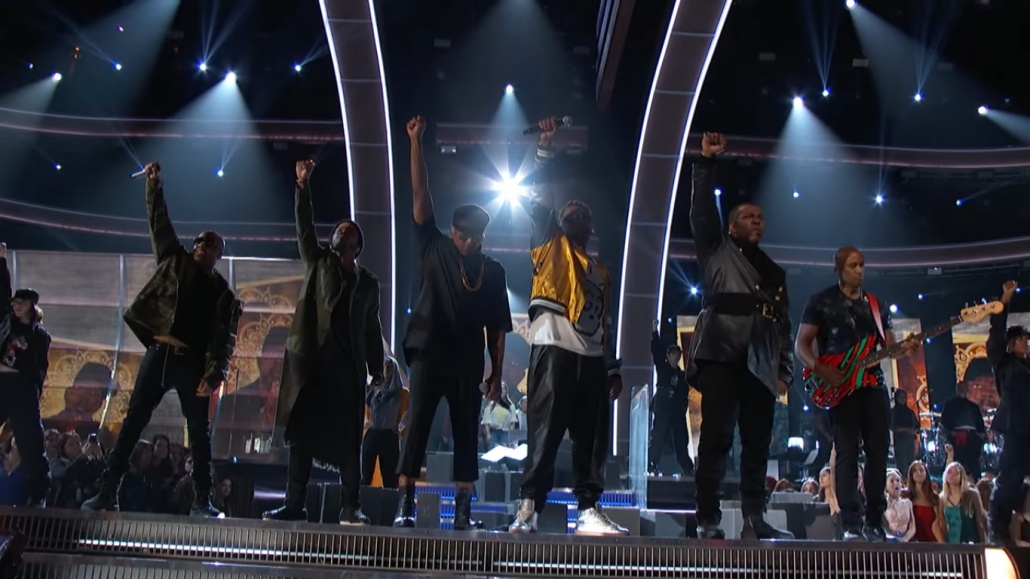Black Muslim Hip Hop Artists Take on “Agent Orange” at the Grammys
by Fatima Ahmed
In today’s politically charged climate, the Grammys found themselves becoming a platform for numerous stars to voice their political stances. From Paris Jackson and Laverne Cox shouting out important social movements like #NoDAPL and #IStandWithGavin to Adele admitting that Beyonce deserved the award for delivering the black anthem of the year, the Grammys quickly became controversial. However, one performance which did not get as much attention was A Tribe Called Quest, Anderson.Paak, and Busta Rhymes’ which powerfully called out the current federal administration.
Many people commended A Tribe Called Quest’s performance for tackling the injustices being carried out in the United States right now. With moving lyrics that focus on the attacks being perpetrated against different minority populations, the performance was fraught with the air of resistance. The imagery was just as impactful, featuring a wall that the performers tear down, a diverse group of people standing in solidarity with the performers, and protest signs that read “No Ban No Wall.” The performance ended with Q-Tip yelling the word “resist” over and over and over again.
“All you Black folks, you must go
All you Mexicans, you must go
And all you poor folks, you must go
Muslims and gays, boy, we hate your ways
So all you bad folks, you must go”
– We the People Lyrics
However, the nuances of the performance delivered on the Grammy stage by A Tribe Called Quest can easily be missed if you don’t realize that many of the black men standing on the stage are also Muslims themselves. Q-Tip, for one, converted to Islam in the mid-1990s and changed his name to Kamaal Ibn John Fareed. Of his religion, Q has said, “I read the Quran and it appealed to me. At the time, I was agnostic and it really breathed spirituality back into me. For me, it’s really a cushion.”
Ali Shaheed Muhammad, another member of A Tribe Called Quest, is also a practicing Muslim. He has used Islam as his inspiration and in the creation of his music. In fact, in the 90’s, he was responsible for creating a music production collective called “The Ummah” – named so because of its reference to a spiritual brotherhood.
Finally, Busta Rhymes is another proud Muslim who was performing with A Tribe Called Quest at the Grammys. When asked how he keeps himself grounded spiritually he referenced his faith in Allah and his spiritual connection with Islam. He has said “at the end of the day that’s [Islam is] pretty much what grounds me.”
These men are a few of the many Muslim men that litter the landscape of rap music, including DJ Khaled, French Montana, Ghostface Killa, Ice Cube, K’naan, Lupe Fiasco, Nas, and T-Pain. In fact, in the 80’s and 90’s, hip hop boasted a lot of Muslim artists with many being associated with Muslim organizations such as the Nation of Islam and the Five Percent Nation. From all accounts, black Muslim men have had significant impact on the hip hop and rap industries, creating for inspirational music.
So, while the performance of A Tribe Called Quest was praised for delivering their message of unity and resistance, it seems ignorant to not identify these men as the Muslims they are calling for their rights. When Busta Rhymes calls “President Agent Orange” out on the Muslim ban, he isn’t doing it as an outsider but a man being attacked by his country for his faith.
We cannot erase the identity of black Muslims in hip hop and rap, just as we cannot associate being Muslim with only being brown-skinned. It is important to remember that Muslims are part of a global religion and are a diverse community. Once we acknowledge the Muslim identities of men like Q-Tip, Muhammad, and Busta, the urgency of the message becomes clearer. Their performance takes on another meaning – one which is seeking for acceptance as much as it is asking for tolerance.
















2017
1,468 views
views
0
comments